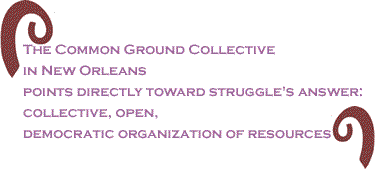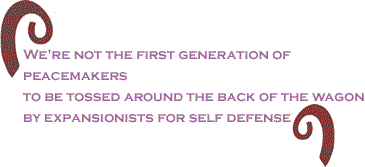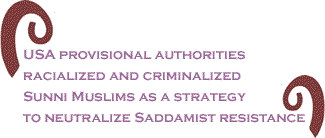
|
|||||||||||||||||||||
|
|
This article originally appeared on PeaceFile.org. Whip lashed by serial collisions of imperial power, dissident movements in the USA brace for the next shocking thing. We have been hijacked into a crashing invasion of Iraq, slammed around by evasive maneuvers in New Orleans, and now along the borderlands of the Southwest USA, signs warn that a highway of accommodation is about to end, dumping us head-on into deserts of aggression upon Latin American peoples. Into each new crisis, empire roars forward, pumping high octane into its five-piston engine. Whether stirring borderland provocations at home, fighting wars of aggression abroad, or exploiting crises of colonized communities anywhere, the five pistons of empire always work the same. The first two pistons of empire rub against each other in a dual cycle of excitement: racialization and criminalization. Whether we are talking about war on terror, containment of victims of Katrina, or preparations for aggression upon Latin American immigrants, empire is busy making peoples into races the better to criminalize them wholesale. The third piston kicks into motion after peoples have been racialized and criminalized. This is the piston of militarization. Guns and propaganda. Brute technologies of power. In Iraq, this piston was stoked on a large scale with advance planning. In New Orleans, as if by reflex, it was improvised overnight. And in the future of the borderlands, militarization is being foreshadowed in word and deed.
The fourth piston is privatization. Political players who deploy military strategies profitize the game so that huge fortunes can be made quickly. In Iraq we see privatization with malice aforethought; in the aftermath of Katrina, privatization on the fly. Along the borderlands, keep an eye out. How much of the militarization will be subcontracted? How much cement will be cast into a great wall, by whom will it be poured, and for how much moolah? Piston five is legitimization, the sweet arts that consolidate empire's victory as “common good” and “enduring freedom” for all. This last piston is knocking around under the hood these days. In Iraq and New Orleans, there is a legitimization gap. That would be better news, if the gap in those places didn't make the border wars seem all the more tempting as a red-blooded thrust to re-energize an imperial base. So these are the five pistons. One right after the other, they fire up for every imperial advance. And they have been working this way at least since Western Pennsylvania was conquered by settlers and the Pennsylvania legislature taken out of Quaker control and put into the hands of a faction led by Benjamin Franklin. We're not the first generation of peacemakers to be tossed around the back of the wagon by expansionists for self defense. Quakers remind us that resistance to the five pistons of empire has been going on at least since the day William Penn named the town of Philadelphia. For Pennsylvania, Penn envisioned an enterprise of peace and reciprocity. Indigenous peoples would be respected, slavery outlawed, etc. A penitentiary would be a dwelling place for thinking things through. For about 75 years, the method worked astonishingly well.
Meanwhile, near Philadelphia grew the Germantown community, with its stream of mystics and cooperative entrepreneurs who came from the farms and universities of Europe into thick Eastern woodlands seeking unification with the One. In 1688, Germantown passed an anti-slavery resolution, said to be the first of its kind among the European immigrant communities of the so-called New World. So when I travel through the heart of German Texas, near towns named Boerne, Fredericksburg, and New Braunfels, I am reminded that empire has never been a totalizing machine. Surely things could be worse and would be, had we not always in North America grown our own resistance, too. Against the five pistons there are – and for several centuries there have been – five modes of resistance. Against the first two pistons of empire (racialization and criminalization) resistance poses counterforces of pluralization and legalization: establishing equity between peoples (not just between persons) and working against the tendency for law to be used a weapon of group domination. When George Fox toured America in 1661 (with William Penn) he sat down and slept beside indigenous peoples. To the offense of white Christians, Fox denounced attitudes of Christian spiritual superiority and practices of slavery, too. In Iraq, the process of racialization and criminalization draws upon thick cultural roots old as the crusades. USA provisional authorities racialized and criminalized Sunni Muslims as a strategy to neutralize Saddamist resistance. Widespread enforcement of de-Baathification violated international laws against collective punishment and provoked deadly backlash, which empire loves to see, because backlash begets backlash, and guess who's ready to privatize such a colossal mess? Recently, thanks to a film by Arkansas brothers Craig and Brent Renaud, we have watched a guardsman say: every civilian in the Middle East is a potential terrorist, the more killed the better. This well-fed attitude is sure to keep the privatizers in business just a little longer, with each passing month good for a few billion more. In New Orleans, says grassroots organizer Malik Rahim, white activists with guns were allowed to pass into the city, while black doctors with medicine were not. Whereas guns were welcomed into a criminalizing situation, medicine could not be allowed to humanize. In New Orleans, a Common Ground Collective respects needs of all individuals and takes seriously the differing circumstances that people face. If cops can make allowances for each other when looting stores for ice and batteries, then activists can make allowances for petty theft among desperate victims, too. This is criminalization's counterforce. Call it legalization of human beings and pluralism between peoples.
Along the borderlands between Latin American and El Norte, pluralism and legalization would mean respecting each other's needs for free movement, suitable work, and fair pay, regardless of national origin. With militarization threatening the borderlands, it is urgent that we seek de-militarization certainly, but more than that, we have to try for something that has no single word. The opposite of militarization is not de-militarization; it is wholesale commitment to an economy of nonviolence, a prioritization of peaceful means to power among the people. If not pacification, shall we call it peace work? Such work builds the kind of human security that follows from experiences of pluralization and legalization. Which brings us to the problem of privatization or the exploitation of a militarized situation for profit. The Common Ground Collective in New Orleans points directly toward struggle's answer: collective, open, democratic organization of resources. I don't think this precludes private property, but it certainly does debunk private profit as an end in itself. And this denunciation of private profit as the ultimate ruler of values is about as communist as Thomas Hobbes (who said you have to throw out the right to all things only if you want peace). The final mode of resistance is education. After pluralization, legalization, pacification, and collective organization, education is badly needed to tend the crafts of knowledge and learning – to counteract legitimization. If these modes of resistance have to be re-invented, then so be it. But we never find ourselves nowhere, especially not right now. I am only trying to think about resistance in hopeful ways as interlocking and multidimensional struggle, already and always on the ground with real life experience of the imperial pistons. De-militarizers are coming to the fore lately, and that's good. But pluralizers are hard at work, and legalizers, too. Collective organizers are always findable. And educators are widely dispersed and active. As we prepare to face the pistons of empire at the borderlands, we may look forward to a historical opportunity to unify American resistance from North to South. And that's far from a nowhere place to begin. Greg Moses is editor of PeaceFile.org and author of Revolution of Conscience: Martin Luther King, Jr. and the Philosophy of Nonviolence. He can be reached at [email protected]. Mr. Moses thanks Tom Wells and the Speak Truth to Power Series at Schreiner University, Kerrville, TX for commissioning these remarks for a talk on Oct. 19, 2005. |
|
| Home | |
Your comments are always welcome. Visit the Contact Us page to send e-Mail or Feedback or Click here to send e-Mail to [email protected] e-Mail re-print notice
If you send us an e-Mail message we may publish all or part of it, unless you tell us it is not for publication. You may also request that we withhold your name. Thank you very much for your readership. |
|
| November 10 2005 Issue 158 |
|||||||||
|
|||||||||
|
|
|||||||||
| Printer Friendly Version in Plain Text or PDF format. Download free Adobe Reader. | |||||||||
 |
|||||||||
 |
|||||||||
| |
|||||||||
| |
|||||||||




























